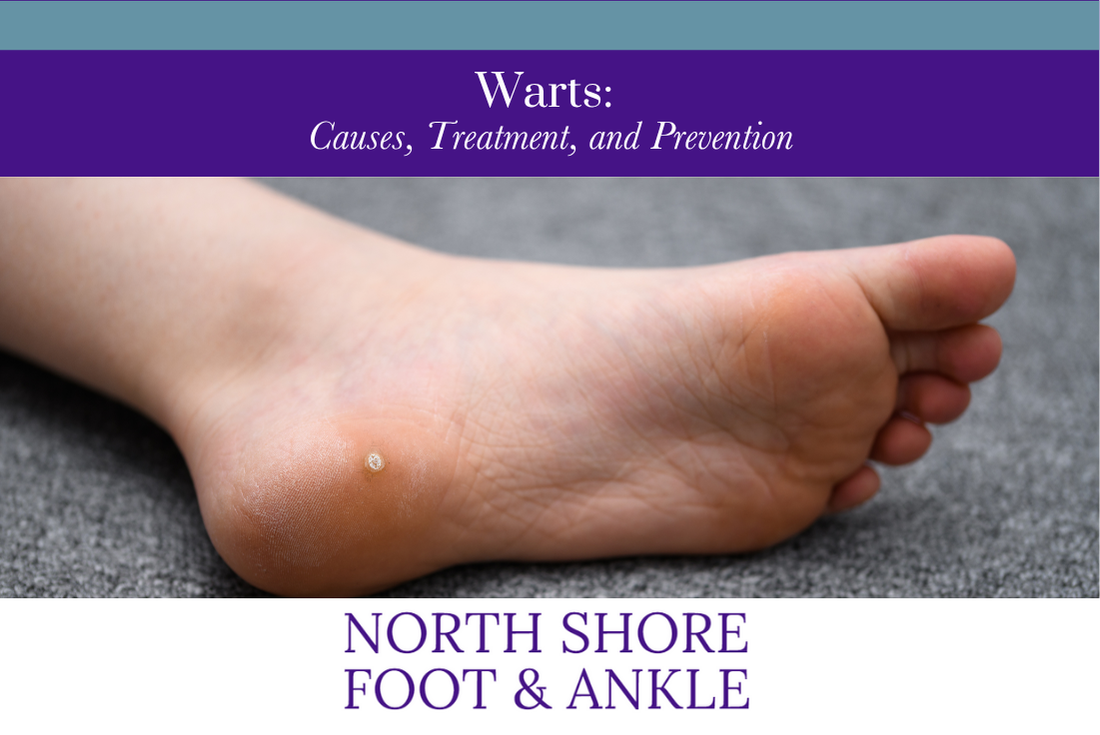Warts are a common and often frustrating skin condition that can affect individuals of all ages. While they are typically harmless, warts can be uncomfortable, unsightly, and sometimes painful, making them a significant concern for many patients. At North Shore Foot & Ankle, our experienced podiatrists offer effective wart treatments to help you achieve healthier, wart-free skin.
What Are Warts?
Warts are small, noncancerous growths that appear on the skin when a virus, specifically the human papillomavirus (HPV), infects the top layer of skin. They often develop on the feet, hands, and other pressure-prone areas, thriving in warm, moist environments. Warts can vary in size, shape, and appearance, and they are typically rough to the touch.
Types of Warts
- Plantar Warts – These appear on the soles of the feet and can be painful when walking or standing due to their inward growth.
- Common Warts – Usually found on the fingers and hands, these are rough, dome-shaped growths.
- Flat Warts – Smaller and smoother, these tend to appear on the face, legs, or arms.
- Periungual Warts – Occur around the fingernails and toenails, potentially causing pain and affecting nail growth.
- Filiform Warts – Long and thread-like, these often develop on the face and neck.
Causes and Risk Factors
Warts are caused by direct contact with HPV. The virus can enter the skin through small cuts or abrasions, making areas like the feet particularly vulnerable, especially in communal spaces like locker rooms, public pools, and gym showers. Factors that increase the risk of developing warts include:
- Weakened immune system
- Skin injuries
- Use of public showers or locker rooms
- Direct contact with a wart on another person
Treatment Options at North Shore Foot & Ankle
While some warts may disappear on their own, professional treatment can significantly reduce discomfort and prevent recurrence. Treatment options include:
- Cryotherapy (Freezing) – Using liquid nitrogen to freeze and destroy the wart tissue.
- Laser Therapy – Utilizing focused light to target and destroy wart tissue.
- Topical Medications – Applying prescription-strength salicylic acid or other antiviral agents.
- Surgical Removal – For persistent warts, minor surgery may be necessary to remove the wart completely.
- Electrosurgery and Curettage – Burning and scraping off the wart.
Preventing Warts
Preventing warts involves minimizing your exposure to HPV and maintaining healthy skin. Key prevention tips include:
- Wearing protective footwear in public showers and locker rooms.
- Avoiding direct contact with warts on other people.
- Keeping feet clean and dry.
- Using foot powders or antiperspirant sprays to reduce moisture.
Q&A Section
Q: Are warts contagious? A: Yes, warts are highly contagious and can spread through direct contact or by touching surfaces contaminated with the virus.
Q: How long does it take for a wart to go away? A: Without treatment, warts can last months to years. With professional care, they can often be removed much faster.
Q: Can I prevent warts from spreading? A: Yes, avoid picking at warts, cover them with a bandage, and practice good hygiene.
Q: Is wart removal painful? A: Some treatments may cause mild discomfort, but most are well-tolerated and highly effective.
Contact North Shore Foot & Ankle
Lynbrook Podiatry Office: 50 Hempstead Ave, Ste B, Lynbrook, NY 11563 | Phone: (516) 599-0302
Syosset Podiatry Office: 175 Jericho Turnpike, Suite 300, Syosset, NY 11791 | Phone: (516) 496-7676
Flushing Podiatry Office: 72-03 164 St., Flushing, NY 11365 | Phone: (718) 591-3320
Rosedale Podiatry Office: 140-04 248 St, Rosedale, NY 11422 | Phone: (718) 949-4844
Plainview Podiatry Office: 1144 Old Country Rd, Plainview, NY 11803 | Phone: (516) 942-0620









